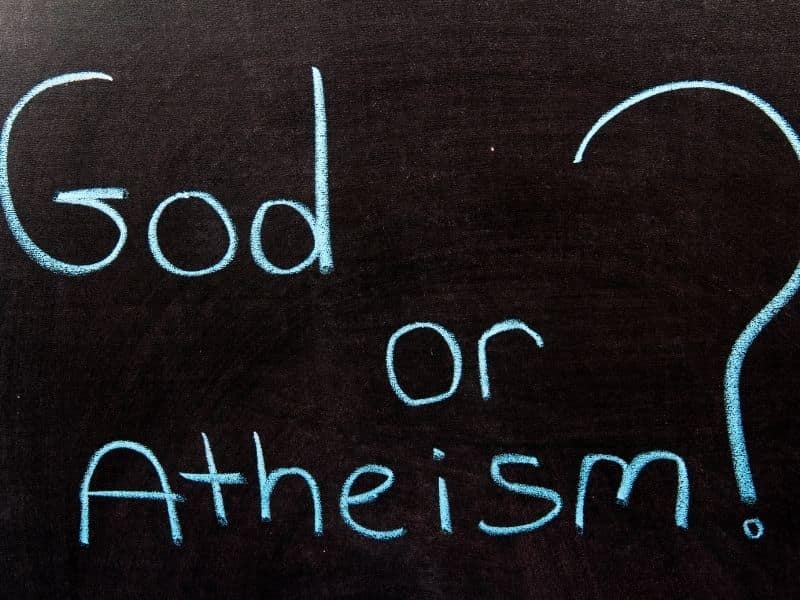If you were raised in a religious household like me and you’re just now starting to question your beliefs, then you’ve probably got more questions than I can count.
From my own experience, I remember that the first question I asked was, “Who is the god of atheists?”
Atheists do not believe in God (or gods), which means that atheism has no god. Unlike Christianity, Islam, Judaism, Buddhism, Paganism, or other world religions, atheism is not a religion. There are no “laws” or spirituality involved in atheism.

I decided to answer this question and write this short post directed towards new atheists, agnostics, or those who are just trying to learn a little bit more about how atheism works. If you’re already an experienced atheist, then this probably isn’t the right post for you. However, if you’re trying to learn the basics, you’ll get a good base of knowledge! Let’s dive in.
What Do Atheists Believe About God?
One of the first myths that I want to dispel is that atheism is not a religion. As a younger individual coming from a religious household, it may be hard to comprehend that there are some people who just don’t believe in God, religion, or spirituality. I know it was hard for me to wrap my little mind around when I first heard about atheists as a child.
However, the more you read and learn, the better you’ll understand atheism and why atheists believe what they do. So, that being said, what exactly do atheists believe about God (or gods)?
When I say that atheists don’t believe in God, I don’t just mean that they don’t believe in God. Atheists don’t believe in any higher power. Put simply- an atheist worldview holds that humans are just animals who were lucky enough to evolve self-awareness. Our self-awareness is what led us to believe that we were somehow special or that “God” gave us a soul.
What Do Atheists Believe About Spirituality?
Atheists also do not believe in spirituality or the human soul. This can be difficult for people with a religious background to comprehend. Almost every major world religion holds that after we die, our eternal souls go somewhere (to Heaven, Hell, reincarnate, etc.). However, atheists don’t believe in any of this.
Most atheist quotes do their best to explain spirituality and the idea of a human soul as our brain’s natural mechanism for dealing with death. As self-aware creatures, death frightens us. So, in order to avoid the stress of dealing with thoughts of a final end, we created a story that death is not the end to make ourselves feel better about our inevitable end.
How Do Atheists Explain Miracles And Supernatural Events?
The most common argument between Atheists and Christians is how to interpret supernatural events. Of course, Christians (or any religious followers, for that matter) will tell you that God is behind everything. Everything happens for a reason, no matter how small or big. Christians believe in miracles and spiritual healing.
Atheists tend to view miracles as bogus. They often explain “miracles” away as freak accidents, anomalies, or psychological events that triggered a physical change. For more astounding miracles (such as people rising from the dead), most atheists claim that these are just mythological exaggerations.
Atheists Vs. Agnostics: Different Ideas About God
If you’re just now looking into atheism, then the chances are that you’ve also come across agnosticism. It’s common for first-time researchers to confuse agnostics with atheists, but the two are quite different.
Although many agnostics identify strongly with an atheist worldview, they don’t completely deny the existence of God, the soul, or miraculous events. Instead, agnostics doubt or question the existence of the spiritual world and God.
Most atheists once started off as agnostics. Agnostics are those who are questioning and trying to find the answer to the question of God. They often look at arguments for atheism and arguments for theism (the belief in a higher power). Then, they compare their research to their own life and eventually make a decision about whether or not they believe in a God.
In fact, many agnostics remain agnostics for their entire life. Agnostics may lean more towards theism or more towards atheism. It all depends on the person. Agnosticism is merely a view that states, “I don’t know. I would believe in God if the evidence were presented to me.”
Final Thoughts
If you’re just now questioning your spirituality, then congratulations. No matter what you end up choosing, it’s important to figure out what exactly you believe in. Also, remember that it’s totally okay to change your beliefs at any time.
Even though I myself am an atheist, I wouldn’t presume to force my beliefs on anybody. If you’re still unsure about what you truly believe, a great place to start is to take my Atheism Quiz here, and start answering some important questions about your own beliefs.